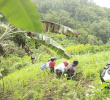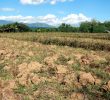
SCRAP AVAs. Farmers under the Agrarian Reform Beneficiaries One Movement (AOM) hold a protest outside the venue of the pubic hearing of the House of the Representatives Committee on Agrarian Reform on the impact of agribusiness venture arrangements (AVAs). Protesting farmers call for the cancellation of all AVAs to grant them full control of their lands awarded by the government. (Medel V. Hernani/davaotoday.com)
DAVAO CITY, Philippines — The Department of Agrarian Reform (DAR) said it is pushing to limit to five years the life span of the agribusiness venture agreements (AVAs) between agrarian reform beneficiaries and the private contracting sector.
DAR Officer-in-Charge Rosalina Bistoyong on Thursday, November 23 said the lowered terms will ensure to provide immediate remedies to parties which are confronted with violations on the provisions of the contract. She said the terms could be renewable depending on the Parties.
Based on the review on existing AVAs, Bistoyong said many have 10 years or more life terms of the contracts. Some have as long as 30 years.
“Within the period no changes can be made. In the process our ARBs are displaced from their awarded land,” she told reporters at the sideline of the public hearing conducted by the House of Representatives Committee on Agrarian Reform here to deliberate two measures regarding the AVAs.
The two measures include House Bill No. 5085, entitled “An Act Regulating the Establishment and Implementation of Agribusiness Ventures Arrangements in the Agrarian Reform Lands” which is authored by Ifugao Rep. Teddy Brawner Baguilat Jr; and the House Bill No. 919, entitled “A Resolution Directing the Committee on Agrarian Reform to Conduct an Investigation, in Aid of Legislation, on the Impact of Agribusiness Venture Arrangements in the Country, in the light of the Mounting Demand of Agrarian Reform Beneficiaries, Farmers and Agricultural Workers for Its Revocation. The Bill was authored by members of the Makabayan bloc.
According to DAR, AVA “is a form of non-land transfer scheme where farm lots are awarded to beneficiaries in paper but control over land use and production remain with companies or private entities.”
Bistoyong said they are targeting to amend the existing DAR Administrative Order No. 9, series of 2006, which currently gives the right of determining the duration of the AVA contract to the parties.
Due to longer duration of some AVAs, the ARBs find themselves getting lesser than what they should be earning, Bistoyong stressed.
“They are not able to earn when in fact the very provisions of the law provides that through the Comprehensive Agrarian Reform Program, our ARBs and smallholder tillers are supposed to be managing, cultivating and are supposed to be in full control of the land,” she said.
“For instance, AVAs could give them a lease rental of P5,000 per hectare, per year. Magbabayad pa sila ng amortization (then they would still have to pay for amortization), would that P5,000 suffice?” she asked.
Bistoyong said most of the ARBs are lured in entering AVAs by investors who are offering signing bonuses that is equal to the worth of the land lease multiplied by some five years.
However, when ARB’s find themselves at the losing end, the DAR cannot intervene immediately because the contract is already entered into by the parties.
“Mahirap kaming makapasok (It’s difficult for us to intervene), if we would want to intervene, it’s quite too late already,” she said.
She said some AVAs result to displacement of farmers from their area.
Bistoyong said there are currently 433 registered AVAs throughout the country. She said 77 of which are in Region 11 alone.
She said they are recommending six AVAs for revocation. The AVA involving the ARBs and the Marsman Estate Plantation Inc. (MEPI) was approved for revocation by the Presidential Agrarian Reform Council (PARC) on September 12, 2016.
Bistoyong said they are discouraging farmers not to go into leaseback agreement “especially so if the lease rental is very, very low as to not give them enough earnings or income to provide the decent life for them.”
She also said they will move to amend the AO to include that AVAs should be registered under the DAR for close monitoring.
Meanwhile, Anakpawis Partylist Rep. Ariel Casilao said they will push for the investigations of onerous AVAs that should be revoked by the government.
Casilao said while there are 433 AVAs monitored by DAR, there are “hundreds of existing AVAs that are not registered under DAR.”
He said factors like DAR’s limitation of personnel and red-tape allow the proliferation of oppressive AVAs.
After the public hearing held at the CAP Auditorium here, Casilao said they will deliberate all the feedbacks and position papers presented by the stakeholders. He said the Makabayan bloc will ensure that cases of disadvantageous AVAs will immediately be recommended for revocation.
“We will wor kout to fast track the possibility of revocation of these AVAs and if, in case, farmers decide to renegotiate the contract, it’s their decision. But if they collectively decide to manage their own, let them be,” he said. (davaotoday.com)










